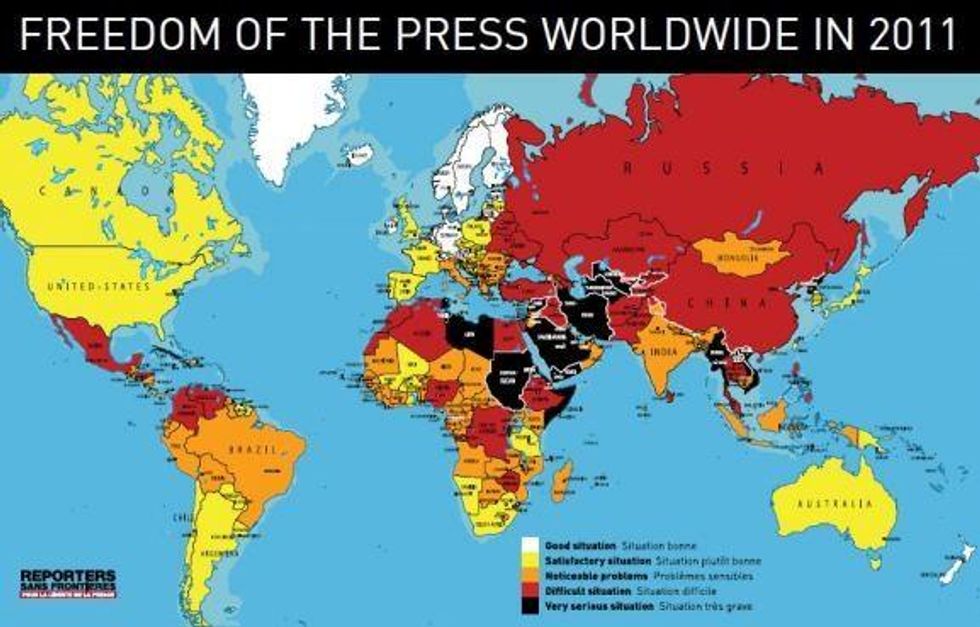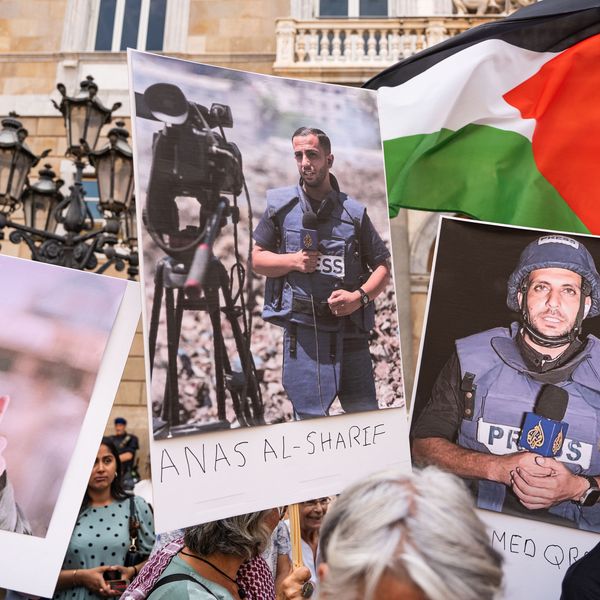We're #47! After Occupy Journalist Arrests, US Plummets in Global Press Freedom Rankings
Reporters Without Borders has released its annual World Press Freedom Index and the United States fell 27 points to No. 47 on the list. Why? "more than 25 [reporters] were subjected to arrests and beatings at the hands of police" during Occupy movement protests.
"The worldwide wave of protests in 2011 also swept through the New World. It dragged the United States (47th) and Chile (80th) down the index, costing them 27 and 47 places respectively. The crackdown on protest movements and the accompanying excesses took their toll on journalists. In the space of two months in the United States, more than 25 were subjected to arrests and beatings at the hands of police who were quick to issue indictments for inappropriate behavior, public nuisance or even lack of accreditation."
Free Press reports:
In last night's State of the Union address, President Obama called for a "renewal of American values." However, over the course of his wide-ranging speech, he made no mention of one core value: the fundamental role of the free press in America.
This absence was highlighted this morning when Reporters Without Borders released its 2011-2012 global Press Freedom Index. After months of journalist arrests and press suppression at Occupy Wall Street-inspired protests, the United States has dropped significantly in the rankings.
According to this report, the U.S. has dropped 27 places to 47th in the world. This is especially troubling as we head into an election year which is sure to spark new conflicts between police and press covering rallies, protests and political events.
And these Occupy arrests are not isolated incidents. According to organizations like the Society for Professional Journalists, the National Press Photographers Association and the Committee to Protect Journalists, the arrests at Occupy events are part of a growing trend in the U.S. and worldwide.

An Urgent Message From Our Co-Founder
Dear Common Dreams reader, The U.S. is on a fast track to authoritarianism like nothing I've ever seen. Meanwhile, corporate news outlets are utterly capitulating to Trump, twisting their coverage to avoid drawing his ire while lining up to stuff cash in his pockets. That's why I believe that Common Dreams is doing the best and most consequential reporting that we've ever done. Our small but mighty team is a progressive reporting powerhouse, covering the news every day that the corporate media never will. Our mission has always been simple: To inform. To inspire. And to ignite change for the common good. Now here's the key piece that I want all our readers to understand: None of this would be possible without your financial support. That's not just some fundraising cliche. It's the absolute and literal truth. We don't accept corporate advertising and never will. We don't have a paywall because we don't think people should be blocked from critical news based on their ability to pay. Everything we do is funded by the donations of readers like you. Will you donate now to help power the nonprofit, independent reporting of Common Dreams? Thank you for being a vital member of our community. Together, we can keep independent journalism alive when it’s needed most. - Craig Brown, Co-founder |
Reporters Without Borders has released its annual World Press Freedom Index and the United States fell 27 points to No. 47 on the list. Why? "more than 25 [reporters] were subjected to arrests and beatings at the hands of police" during Occupy movement protests.
"The worldwide wave of protests in 2011 also swept through the New World. It dragged the United States (47th) and Chile (80th) down the index, costing them 27 and 47 places respectively. The crackdown on protest movements and the accompanying excesses took their toll on journalists. In the space of two months in the United States, more than 25 were subjected to arrests and beatings at the hands of police who were quick to issue indictments for inappropriate behavior, public nuisance or even lack of accreditation."
Free Press reports:
In last night's State of the Union address, President Obama called for a "renewal of American values." However, over the course of his wide-ranging speech, he made no mention of one core value: the fundamental role of the free press in America.
This absence was highlighted this morning when Reporters Without Borders released its 2011-2012 global Press Freedom Index. After months of journalist arrests and press suppression at Occupy Wall Street-inspired protests, the United States has dropped significantly in the rankings.
According to this report, the U.S. has dropped 27 places to 47th in the world. This is especially troubling as we head into an election year which is sure to spark new conflicts between police and press covering rallies, protests and political events.
And these Occupy arrests are not isolated incidents. According to organizations like the Society for Professional Journalists, the National Press Photographers Association and the Committee to Protect Journalists, the arrests at Occupy events are part of a growing trend in the U.S. and worldwide.

Reporters Without Borders has released its annual World Press Freedom Index and the United States fell 27 points to No. 47 on the list. Why? "more than 25 [reporters] were subjected to arrests and beatings at the hands of police" during Occupy movement protests.
"The worldwide wave of protests in 2011 also swept through the New World. It dragged the United States (47th) and Chile (80th) down the index, costing them 27 and 47 places respectively. The crackdown on protest movements and the accompanying excesses took their toll on journalists. In the space of two months in the United States, more than 25 were subjected to arrests and beatings at the hands of police who were quick to issue indictments for inappropriate behavior, public nuisance or even lack of accreditation."
Free Press reports:
In last night's State of the Union address, President Obama called for a "renewal of American values." However, over the course of his wide-ranging speech, he made no mention of one core value: the fundamental role of the free press in America.
This absence was highlighted this morning when Reporters Without Borders released its 2011-2012 global Press Freedom Index. After months of journalist arrests and press suppression at Occupy Wall Street-inspired protests, the United States has dropped significantly in the rankings.
According to this report, the U.S. has dropped 27 places to 47th in the world. This is especially troubling as we head into an election year which is sure to spark new conflicts between police and press covering rallies, protests and political events.
And these Occupy arrests are not isolated incidents. According to organizations like the Society for Professional Journalists, the National Press Photographers Association and the Committee to Protect Journalists, the arrests at Occupy events are part of a growing trend in the U.S. and worldwide.


